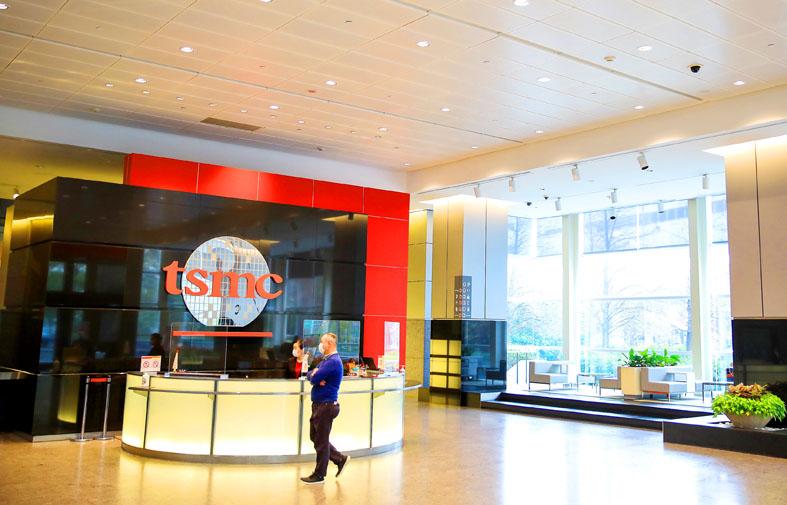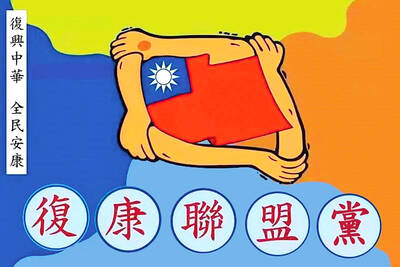Sales at the world’s 10 largest pure-play foundry operators hit new quarterly highs in the fourth quarter of last year, for a 10th consecutive quarter, with Taiwan Semiconductor Manufacturing Co (TSMC, 台積電) retaining its position as the world’s largest contract chipmaker, Taipei-based market information advisory firm TrendForce Corp (集邦科技) said.
TrendForce on Monday last week said that the top 10 contract chipmakers generated US$29.55 billion in sales in the fourth quarter, up 8.3 percent from a quarter earlier, accounting for 98 percent of the global total.
TSMC posted US$15.75 billion in fourth-quarter revenue, up 5.8 percent from a quarter earlier and accounting for 52.1 percent of the global total, TrendForce data showed.

Photo: Bloomberg
TrendForce said TSMC benefited from the debut of the iPhone 13 series, which went on sale in September last year and boosted the shipment of chips made using its advanced 5-nanometer process.
However, that growth was offset by a downturn in the Chinese smartphone market affecting TSMC chips made using its 6-nanometer and 7-nanometer technologies, it said.
United Microelectronics Corp (UMC, 聯電) took the third spot after generating US$2.12 billion in sales in the fourth quarter, up 5.8 percent from a year earlier and accounting for 7 percent of the global market.
Powerchip Semiconductor Manufacturing Corp (力積電) and Vanguard International Semiconductor Corp (世界先進) placed seventh and eighth respectively, with US$619 million and US$458 million in sales, or a 2 percent and 1.5 percent share of the world market respectively.
South Korea’s Samsung Electronics Co placed second after posting US$5.54 billion in sales in the fourth quarter, up 15.3 percent from a quarter earlier and accounting for 18.3 percent of total global sales.
As Samsung is one of the few contract chipmakers with its own 7-nanometer process, and production based on its 4-nanometer and 5-nanometer processes is increasing, its fourth-quarter sales rose at a double-digit percentage pace, TrendForce said.
Samsung’s sales were also pushed up by smartphone IC designer Qualcomm Inc, whose chips used in flagship smartphone models entered commercial production.
US-based GlobalFoundries Inc posted US$1.85 billion in sales in the fourth quarter to take fourth place with a 6.1 percent global market share, ahead of China’s Semiconductor Manufacturing International Corp (中芯國際), which posted US$1.58 billion in sales.
Shanghai-based Hua Hong Semiconductor Ltd (華虹半導體) came sixth with US$864 million in sales, ahead of Israel’s Tower Semiconductor Ltd in ninth place with US$412 million in sales and South Korea’s Nextchip Corp in 10th place with US$352 million in sales.
TrendForce said the top 10 contract chipmakers are expected to posts sales growth in the first quarter of this year largely on the back of an increase in average sales prices.

AIR DEFENSE: The Norwegian missile system has proved highly effective in Ukraine in its war against Russia, and the US has recommended it for Taiwan, an expert said The Norwegian Advanced Surface-to-Air Missile Systems (NASAMS) Taiwan ordered from the US would be installed in strategically important positions in Taipei and New Taipei City to guard the region, the Ministry of National Defense said in statement yesterday. The air defense system would be deployed in Taipei’s Songshan District (松山) and New Taipei City’s Tamsui District (淡水), the ministry said, adding that the systems could be delivered as soon as the end of this year. The US Defense Security Cooperation Agency has previously said that three NASAMS would be sold to Taiwan. The weapons are part of the 17th US arms sale to

SERIOUS ALLEGATIONS: The suspects formed spy networks and paramilitary groups to kill government officials during a possible Chinese invasion, prosecutors said Prosecutors have indicted seven retired military officers, members of the Rehabilitation Alliance Party, for allegedly obtaining funds from China, and forming paramilitary groups and assassination squads in Taiwan to collaborate with Chinese troops in a possible war. The suspects contravened the National Security Act (國家安全法) by taking photos and drawing maps of key radar stations, missile installations and the American Institute in Taiwan’s headquarters in Taipei, prosecutors said. They allegedly prepared to collaborate with China during a possible invasion of Taiwan, prosecutors said. Retired military officer Chu Hung-i (屈宏義), 62, a Republic of China Army Academy graduate, went to China

INSURRECTION: The NSB said it found evidence the CCP was seeking snipers in Taiwan to target members of the military and foreign organizations in the event of an invasion The number of Chinese spies prosecuted in Taiwan has grown threefold over a four-year period, the National Security Bureau (NSB) said in a report released yesterday. In 2021 and 2022, 16 and 10 spies were prosecuted respectively, but that number grew to 64 last year, it said, adding that the Chinese Communist Party (CCP) was working with gangs in Taiwan to develop a network of armed spies. Spies in Taiwan have on behalf of the CCP used a variety of channels and methods to infiltrate all sectors of the country, and recruited Taiwanese to cooperate in developing organizations and obtaining sensitive information

BREAKTHROUGH: The US is making chips on par in yield and quality with Taiwan, despite people saying that it could not happen, the official said Taiwan Semiconductor Manufacturing Co (TSMC, 台積電) has begun producing advanced 4-nanometer (nm) chips for US customers in Arizona, US Secretary of Commerce Gina Raimondo said, a milestone in the semiconductor efforts of the administration of US President Joe Biden. In November last year, the commerce department finalized a US$6.6 billion grant to TSMC’s US unit for semiconductor production in Phoenix, Arizona. “For the first time ever in our country’s history, we are making leading edge 4-nanometer chips on American soil, American workers — on par in yield and quality with Taiwan,” Raimondo said, adding that production had begun in recent